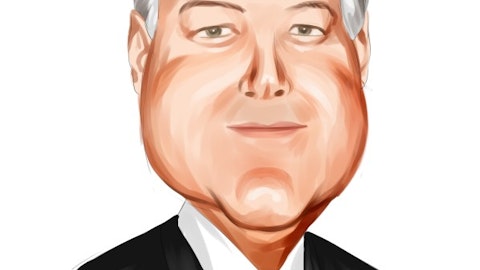
Intel Corporation (NASDAQ:INTC) saw Tudor increase its stake over 500% last quarter. Intel is down over 30% year to date on continued PC sale weakness. Despite this stagnant segment, Intel does expect to grow revenue by 1% next year, with data center growth countering slowing PC sales. The chip-making giant pays quite the dividend, yielding 4.4%, which is even more impressive when you consider it is only a 35% payout of earnings. We see interim growth as being limited due to an expected decline in PC growth, but remain confident in Intel’s dividend given its $10 billion in cash on hand. Intel is still one of the top ten tech stocks loved by hedge funds (see all 10 here).
Google Inc (NASDAQ:GOOG) is now Tudor’s 13th largest 13F holding following a 300% increase in the firm’s shares last quarter. Despite an earnings hiccup – with Google missing estimates by 15% in 3Q – the stock managed to be up 30% during the third quarter. The search giant is expected to grow revenues by 16% in 2013, driven in part by the competed integration of Motorola Mobility. Google’s core business is expected to perform well also, with revenues up 21% in 2012 and 17% in 2013. Google trades a 22x trailing earnings, but is just a mere 13.5x on a forward-looking basis. Steven Cohen was one of the many billionaires who was bullish on Google last quarter (see Steven Cohen and SAC Capital’s top picks).
Dell Inc. (NASDAQ:DELL) was a near 1,000% increase for Tudor in 3Q – the largest of his five big bets listed. This PC company has been beaten down due to similar pressures as Intel: slowing PC sales. Dell is weathering the storm much better than rival HP, but should still manage to grow earnings over the next five years thanks to initiatives in the acquisitions market.
Dell hopes to break into the software business and its $2.4 billion purchase of Quest Software earlier this year was a big step. Assuming Dell can make a successful pivot toward software and continue innovation in its hardware segment – most notably via an ultrabook-tablet combo – we believe it is a value play. Dell trades at only 6x forward earnings, but also has a 6% expected long-term EPS growth rate, putting its PEG close to 1.0. Bridgewater Associates’ Ray Dalio upped his stake in Dell by over 60% last quarter (see Ray Dalio’s other key moves here).
Two of Tudor’s other big increases were in the pharma industry: Pfizer Inc. (NYSE:PFE) and Eli Lilly & Co. (NYSE:LLY). Pfizer was one of Tudor’s more modest increases, upping his stake 175%. Pfizer is quite the pick in the pharma space, and is one of the top loved drug stocks by hedge funds. Pfizer is raising cash with the sale of its nutrition business, and an upcoming IPO of its animal health business (partial) should be a bullish scenario going forward. This cash should go toward share buybacks and supporting its already strong 3.5% dividend yield. Solid long-run earnings growth is expected to come via Pfizer’s continued entry into emerging markets as a result of rising health standards, aggregately speaking. Billionaire Ken Fisher, founder of Fisher Asset Management, has Pfizer as his largest stock holding (check out Ken Fisher’s top picks).
Eli Lilly is another one of Tudor’s favorite pharma stocks; it was a near 1,000% increase for Tudor in 3Q, and pays a higher dividend yield than Pfizer at 4.1%. The big challenge for Eli Lilly has been countering the loss of revenue due to patent expiration of top drug Zyprexa. These challenges are likely to continue as Eli Lilly loses patent protection of Cymbalta (2013) and Evista (2014) over the next two years. These patent losses translate into an expected 4% annual decline in earnings over the next half-decade. Of the two pharma stocks mentioned here, we like Pfizer the best, given its growth prospects and operating margin superiority, 32% compared to Eli Lilly’s 20%. Jim Simons is one of Eli Lilly’s biggest backers among the hedge funds we track (check out Jim Simons’ latest picks).
To recap: Tudor is making some big bets in tech value opportunities, Intel and Dell, that could see interim pressure but could reward investors in the longer term assuming they can capitalize on a turnaround. Google, meanwhile, is a solid growth opportunity, owning the search market with a massive potential in mobile. Pfizer and Eli Lilly are two solid dividend-paying pharma stocks, but we see Pfizer as having the best long-term prospects.





